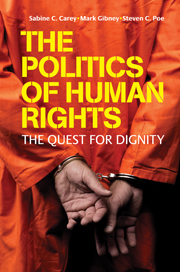Book contents
- Frontmatter
- Contents
- List of text boxes
- List of figures
- List of tables
- List of abbreviations
- Introduction
- Part I Human rights and state responsibilities
- Part II Empirical representations and explanations of human rights violations
- Part III Intervening and rebuilding in the wake of repression
- 6 Intervening to protect human rights
- 7 Rebuilding society in the aftermath of repression
- 8 Towards the future
- Bibliography
- Index
8 - Towards the future
Published online by Cambridge University Press: 05 June 2012
- Frontmatter
- Contents
- List of text boxes
- List of figures
- List of tables
- List of abbreviations
- Introduction
- Part I Human rights and state responsibilities
- Part II Empirical representations and explanations of human rights violations
- Part III Intervening and rebuilding in the wake of repression
- 6 Intervening to protect human rights
- 7 Rebuilding society in the aftermath of repression
- 8 Towards the future
- Bibliography
- Index
Summary
This brief concluding chapter focuses on three related issues. The first involves how human rights have come to be conceptualized. As we have noted before, there has been a strong tendency to equate human rights with atrocities carried out in distant lands with no seeming or apparent connection with our own lives. In that way, human rights have been limited to ‘other’ people – other than ourselves, that is.
Under this approach, starvation in Ethiopia is seen only as Ethiopia's human rights problem; torture in Egypt is seen only as Egypt's human rights problem; the AIDS epidemic in South Africa is seen only as South Africa's human rights problem, and so on. As the reader will know by now, we reject this thinking. Just as human rights are themselves universal, so is the responsibility to protect human rights universal as well. At the very least, many of the things that affect the lives of everyone, such as health care, education, environmental quality, food safety, working conditions and so on, involve human rights.
The second point we want to highlight is that it would be wrong to be fatalistic about the prospects of human rights for the future. We take the opposite view because the empirical evidence, from around the globe, is on our side. For example, during the Second World War, the Nazi regime in Germany committed probably the worst genocide in the history of humankind.
- Type
- Chapter
- Information
- The Politics of Human RightsThe Quest for Dignity, pp. 224 - 228Publisher: Cambridge University PressPrint publication year: 2010

